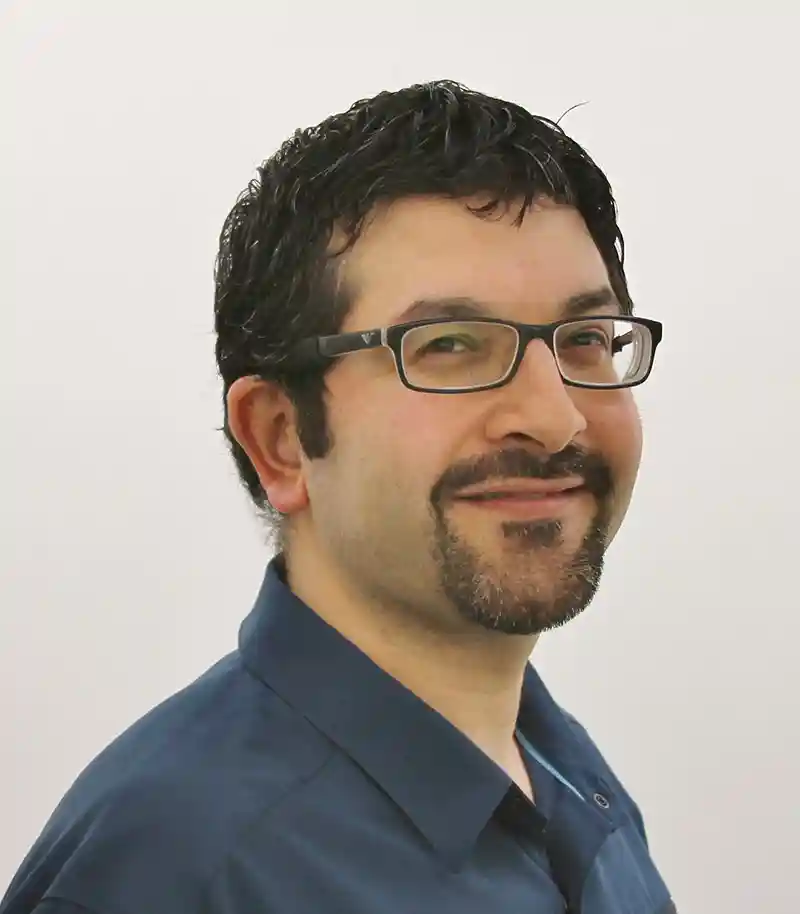Postdoctoral researcher contributes research to improve disease understanding
Meet Behdad (Ben) Afzali, M.D., Ph.D.
Behdad (Ben) Afzali, M.D., Ph.D., was challenged by an earlier mentor to think of human diseases that do not interact with the immune system.

As a participant in the National Institutes of Health Research Participation Programs, Ben Afzali, M.D., Ph.D., studied mutations in the BACH2 protein. The mutations are linked to significant immune system abnormalities in patients who carry the mutations. His research may lead to more effective treatment methods. (Credit: Colleen Dundas at/NIAMS)
Dr. Afzali earned his medical degree and doctoral degree in immunology from the University of London, England. He became aware of a research opportunity at the National Institutes of Health (NIH) pertaining to his field of study.
Initially, Dr. Afzali was a part of the Wellcome Trust Intermediate Clinical Research Fellowship. When the funding for the fellowship ended, he transitioned to the NIH Research Participation Programs to continue his research interests at a postdoctoral level.
NIH Research Participation Programs provide college students, recent graduates and postdoctoral fellows with opportunities to participate in project-specific NIH research, current public health research and developmental activities. The programs promote networking with world-class scientists and use of state-of-the-art equipment to expand participants’ knowledge in their fields of study while exposing them to new areas of basic and applied research. These research activities help transition classroom theory into hands-on experience, and help provide answers to today’s pressing scientific questions.
For the duration of his appointment, Dr. Afzali was stationed in the Molecular Immunology and Inflammation Branch of the National Institute of Arthritis and Musculoskeletal and Skin Diseases (NIAMS) at NIH in Bethesda, Maryland.
This was a wonderful experience for me, but I would like to stress that the research environment was key,” Dr. Afzali said. “The NIH is a tremendous place to conduct research, and it was a real privilege training here.
As part of an international collaboration during Dr. Afzali’s time at NIAMS, he and his mentor John O’Shea, M.D., identified patients with mutations of a protein that regulates gene expression.
Cell proteins called transcription factors (TFs) bind to DNA and cause RNA to be produced, which in turn produces other proteins. In the immune system, TFs are responsible for turning information received from the environment – for example, the presence of infection – into action, such as production of antibodies to fight infection.
Dr. Afzali focused on the TF called BACH2. It was the subject of genetic mutation in two families with very similar clinical features. Both families had members suffering from abnormalities of the immune system causing a combination of both immunodeficiency and autoimmunity. Immunodeficiency is the condition in whom the immune system is unable to provide adequate protection against infections with foreign bacteria, viruses and fungi. By contrast, autoimmunity is the condition in whom the immune system is misdirected and attacks components of the self instead of foreign invaders. However, patients with BACH2 mutations suffered from a combination of recurrent infections (immunodeficiency) and inflamed colons (autoimmunity).
Unlike many other genetic diseases, the patients who had BACH2 mutations only had mutations in one of the two copies of the gene, so it was unclear why the normal copy could not prevent development of disease. Dr. Afzali’s findings suggested that, in fact, mutations in one copy of a gene do seem to matter if they occur in very special genes that are regulated in a very stringent manner. These genes reside within complex regions of the genome called super-enhancers. These are areas of the genome that have complex regulation of expression.
Because of Dr. Afzali’s research, more is known about the broad extent of diseases where a combination of both immunodeficiency and autoimmunity is apparent. For some patients, this information will enable a more accurate diagnosis.
“I received exceptional training during my time, and the research went well,” Dr. Afzali said. “I think my mentor and I made an interesting contribution. I met an amazingly collaborative group of people.”
When the fellowship ended, Dr. Afzali wished to continue his research. In an effort to do so, he wrote grants and applied for a full-time position as a principal investigator. He was recruited as a tenure-track principal investigator in the Kidney Diseases Branch of the National Institute of Diabetes and Digestive and Kidney Diseases (NIDDK) at NIH.
“I was very lucky to have great mentorship from multiple sources and to make lasting friendships with the people that continue to be my collaborators today,” Dr. Afzali said.
The NIH Research Participation Programs are funded by NIH and administered through the U.S. Department of Energy’s (DOE) Oak Ridge Institute for Science and Education (ORISE). ORISE is managed for DOE by ORAU.

